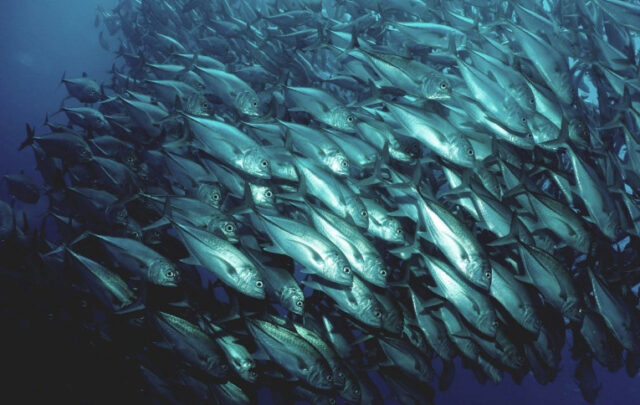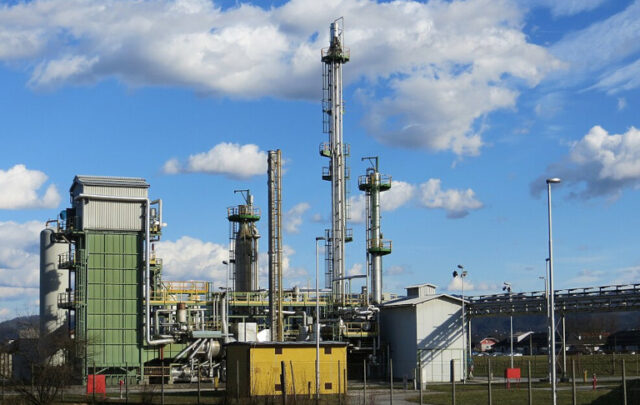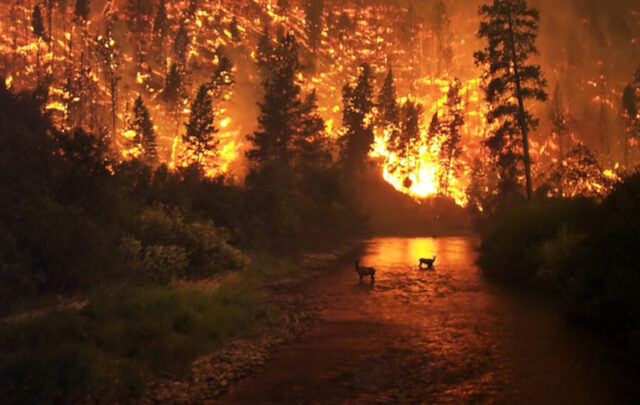GNN Editor’s note: Long-time GNN contributor Adam Porter is the oil and economics correspondent for Al Jazeera’s English language web site. A Londoner who recently moved to Catalunya, he heats his house with wood. Recently, he talked with GNN editor Anthony Lappé about the phenomenon known as “peak oil”:
GNN: What does “peak oil” mean?
Porter: It’s basically the idea that at some point in time oil production may peak. In other words that oil is a finite commodity and at some point we humans will only be able to get a certain amount out of the ground each day. Production may be curtailed by a number of factors, for example like we start to run out. At the point at which we have consumed 50% of the world’s available oil, getting enough of the stuff out of the ground to satisfy our daily demands may become impossible. That ‘peak’ may also be exacerbated by investment costs, like it costs a lot of cash (and energy) to build an oil rig.
It isn’t just a case of ‘oh we’ve run out’, it’s about being able to continue to provide the world with the oil it desires each day. If we fail to do that then you could imagine there would be giant leaps in the price. At the moment the rise in cost is because there is only around 0.5% of slack in the system. Less than 500,000 barrels a day in a system that consumes 83 million a day. Some people are saying this is the start of the peak. Others say it is under-investment by oil producers who were angry at very low oil prices ten years back. They would not invest so when consumption rose, for example in China, they were caught out.
Just for clarity some people, mainly Russians and a few others, think that oil is a never-ending commodity. That it constantly refills wells, seeping up from deep within the Earth. This is called the `Abiotic Theory.` If I may be so bold as to put forward a personal view, the Russians that invented this idea have been at the Crackski Pipeovich a bit too often.
GNN: How much oil is left?
Porter: This is indeed the correct question to ask as I would expect from GNN. No one knows. The history of oil has seen a lot of vested interests both downplaying and over stating oil reserves. To such an extent now no one really knows what is left. Basic examples are OPEC and Royal Dutch Shell. In the 1980s OPEC decided to allow each of its eleven states to pump oil based on how much they had in reserve. So, the more reserves you said you had then the more oil you could pump…and of course the more money you could make. Overnight, Kuwait’s reserves doubled. Which was handy for them.
Everyone followed suit including Saddam in Iraq and the junta in Saudi Arabia. What is more interesting is that since the 1980s, despite pumping millions of barrels a day, their stated reserves are the same today. In some cases they’ve even increased. The International Energy Agency have demanded urgent transparency in reserve figures so that we can continue to rely on their technical data. Even the IEA are scared they will simply become irrelevant because the stats they base their studies on are so obviously dubious. However, they may be waiting some time. If, for example, Saudi announced that their reserves were in fact half of what they said the oil market would go ballistic.
GNN: How much is in Iraq? The U.S. hasn’t made much money on Iraqi oil, doesn’t that undercut the theory that we went there for the oil?
Porter: Well, Iraq is very hard to tell. They still say around 112bn barrels but those are Saddam’s magic figures, actually with a little extra on top. There is certainly a lot of it and it is generally perceived to be cheap to extract since it is near the surface and doesn’t require huge amounts of cleaning like the Canadian tar sands you may have heard of.
As for U.S. foreign policy, I shall try and be brief. Whether you support President Bush’s worldview or not I think he had to go into Iraq. He couldn’t not go in. His ideology drove him and that ideology is underpinned by the God-given right of America to have all the cheap energy it requires. Oil is power, power is oil. The region is not going to be less important, it is going to become more important. Because if oil does peak five countries are going to have most of it. Iraq, Saudi, Iran, Abu Dhabi and Kuwait. So Bush, who understands the peak argument as he has said, simply could not avoid it. Of course beforehand they talked up the possibilities of cheap oil, welcoming Iraqis waving flowers and so on. I don’t think it’s worked out quite as they thought. But I don’t think they really mind. To President Bush an Iraq under Saddam is far worse than Iraq as a failed state full of U.S. troops.
GNN: What would happen if oil reached 60 or 70 dollars a barrel?
Porter: Well, this is interesting. Firstly oil costs take time to knock through. We are only starting to see the effects of $40 oil right now. Oil needs to stay high for a period of time, which it is doing. Then six months later you will start to notice effects. Rising transport costs will be one, rising food prices may well be another. Transport is very at risk from oil price increases as we don’t have wind powered cars or solar lorries. So is anything transported, like food. Of course, Americans are already seeing higher petrol prices at the pump and your heating costs have doubled in the past three years. The absence of tax in your country means the costs are passed on to you quicker as well, very similar to Iran in fact. Now there’s an irony!
However, some people think that high oil costs will be good for the economy. A huge cash infusion, like the internet boom v2.0 but with a smaller group of people benefiting.
But as for fifty dollar prices I reckon we will start to see the effects next springtime.
GNN: Why aren’t the major industrial powers panicking if the situation is so dire?
Porter: They certainly wouldn’t panic in public. Not good for votes/place in history etc. If they were trying to remedy the situation they might try and drill in previously protected wildlife reserves and/or invade other countries with lots of oil and I can’t see anyone doing tha… D’oh!
GNN: What’s the alternative?
Porter: Phew. In the long term renewables. In the short, energy conservation. That is the most important since renewables are still a long way off being effective. Especially, as I have mentioned, for transport. I’m afraid however that we should have started developing renewables some thirty years back. They really are a drop in the energy ocean, especially in the so-called emerging economies, China, India, Brazil. They are full of cars and lorries and motorbikes that no solar panel is going to replace.
GNN: Are people deluded about Hydrogen? What about sugar, corn and other alcohols?
Porter: Well, I can’t claim to be a major expert on hydrogen. But basically it provides somewhere between nil and bugger-all of our current energy needs. It does have possibilities, especially with transport but these are many years hence. The other fuels you mention also have possibilities but if we wanted a corn-based energy economy you would have to plant a hell of a lot of corn.
One of the things people forget about renewables is that it costs to create them. So how much of our current energy are you using to make this new energy? Hydrogen cells are of course plastic and metals, which we currently make from oil. Wind farms are made of metals and lubricated by oil and transported to the site by…er…oil. I would love to be able to tell you of a so called “bridge fuel” that will take us from the fossil fuel economy to the clean renewable one. It may be nuclear, and as I live in France I’m laughing about that. Having said that I hear nuclear also has some drawbacks…
GNN: Won’t the market take care of everything? If prices get too high for oil won’t that spur efforts to create new technologies or discover new fuels?
Porter: This is more opinion. Mine is, no chance. The market will drive the shortages as it will fuel price increases. This makes more money for those who own and produce the oil and its products. The market will not be interested in investing mega-quantum amounts of hard cash to try and make some fuels out of lentils. The people who own oil producing countries or oil companies will just hire a few extra security guards rather than speculate their wealth away. Price rises also make tiny oil fields, unprofitable at $20 a barrel, now profitable at $50. Make no mistake this is going to be a boom time for the oil industry. It is the rest of us that may have to worry if the arrival of the peak is correct. At the very least in the next few years they are going to have to spend billions in investment. The IEA said recently it would take $500bn a year for the next sixteen years, totally out of the question. It was such a stupid pronouncement I couldn’t understand what they were on about.
The principles of the so-called free market are a silly joke. They reflect nothing. Just my opinion though, much as I like looking at their machinations of course.
GNN: How will western society change if oil hits $80, $100 a barrel?
Porter: We will travel everywhere on pogo stick. Or maybe unicycle because we can’t afford the rubber for our bike tires. We will be clamoring for nuclear power stations. The poorest 50% of the world’s population and the richest 0.5% won’t notice anything has happened. Martha Stewert will say things like “I thought it had always been $25 a gallon,” which will spark riots near her last remaining Beverley Hills store. The others closed because people couldn’t afford to drive to them. There will only be one hour and a bit of TV a week. But at least that will be three episodes of the Simpsons on Fox. Fair, Balanced and Not Bankrupt Unlike The Others will be its slogan. You will be annoyed that you didn’t get that place with a garden, because now everyone who can grows as much of their own food as if possible.
Then again they have to give fifty per cent of it to the state collective system. You will eye your pet dog/cat as a source of possible protein if the winter is a bit harsh.
The blame for this decade-long economic “really very soft patch” (A. Greenspan Jr. 2014) will be heaped upon single mothers, the 1960s, an out-of-control robotic policeman in Detroit, the lack of space in the internment camps for liberals, Barbara Streisand and of course the still-at-large Osama Bin Laden who is now President of France. Oh, and the top 1% will get tax cuts to ‘kickstart the economy’.
Hey, you think I’m joking…?
[end]
For more on peak oil:
The End of Suburbia (documentary)
The End of Oil by Paul Roberts
A sampling of Porter’s reporting for Al Jazeera’s web site:
Oil Market Myths Shattered: Is The ‘Terror Premium’ Nonsense?
Instability Looms As Currencies Slide





